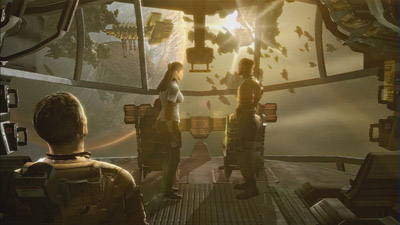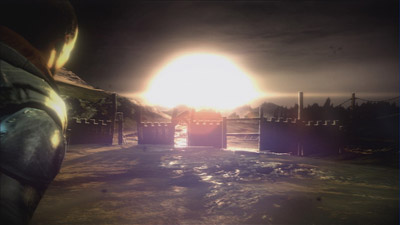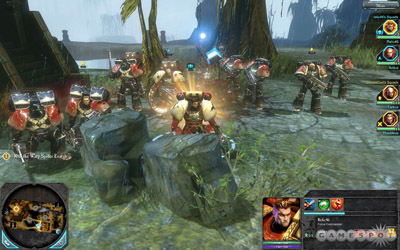Dead Space

I would start this by saying that I really enjoyed playing Dead Space. It reminded me about Bioshock, Metroid Prime 3 and Resident Evil 4 and the things I have to complain about are more relevant to a larger discussion about games, commercialism and artistry than they are about the game itself.
For a game that is new in so many ways, Dead Space leaves a nagging feeling that it’s playing it safe. Sure, the premise of the game – having (essentially) Resident Evil play out in a System Shock-setting and basing the gameplay around slicing off monsters’ limbs in order to impede their progress hasn’t really been done before, and the outer space-related challenges such as zero-gravity or vacuum have been implemented with finesse for a gameplay that mixes things up without feeling out of place. Problem is, it really comes off as a bulleted list of these features tacked onto someone’s perception of a Bioshock/Resident Evil 4 hybrid and while the sections of funky gameplay are nice they are just that – walled-in sections in a game that knows exactly where it’s coming from.
This applies to the story as well. The background story is rather extensive and there are both clever allusions and political commentary in it, but the plot in the actual game is predictable down to every twist and it is difficult to sympathize with your generic horror movie victims. The biggest problem I had with it was with the protagnist Isaac Clarke though – there seems to have been some decision to make him into a silent protagonist. This is perfectly fine if you center the story around something other than the player – good even, because not writing any emotions for a character guarantees that no-one will be alienated from him – but the plot of Dead Space revolves in part around Isaac and his missing wife. The moments you are actually presented with these tidbits feel off until you read Isaac’s personal notes about objectives, where it seems someone tried to cram in some character at the last minute – making it feel even more awkward, silly even.
I wonder why I hold Dead Space to such high standards. Might be because it is one of the games from EAs new push for innovation, or it might be because while it is a good game in every aspect, it does not have as good horror elements as Resident Evil or as involving a story as Bioshock. It is a very solid game but when it comes so close to being great the things that are just average become much more glaring.
Pixeljunk on IGF
Dylan Cuthbert of Q-Games responds to some of the criticism “Pixeljunk Eden” seems to have gotten for being a somewhat high-profile title in the IGF. I have already mentioned that I think reducing the IGF to a marketing opportunity would itself be going against the indie spirit, though Cuthbert gives more detailed reasons from several angles as to why he doesn’t feel the critique is justified. Even though some of it is surely genuine concern that indie outposts will be commercialised, I would guess that some of the objections come from jealousy-induced elitism – and I guess there are elements of that in every indie scene. I will have to ask Kianis how he feels about it next time I see him.
There have been far too much interesting things happening at the GDC for me to do a write-up about it, but I would like to congratulate Erik Svedäng on the IGF win. I have only played Blueberry Garden for a few minutes, not enough to build an informed opinion about it considering the kind of game it is, but I will be sure to get it when it is released.
the Tetris Company prevails?

A bit of backstory; Tetris was first created in 1985 by Alexey Pajitnov, Vadim Gerasimov and Dmitri Pavlovsky, and it has among the most interesting legal histories for any game. During it’s first 5-10 years it was a battle of rights between the Soviet Governement, Nintendo, Atari and others, and in 1996 the Tetris Company was formed and started a campaign against freeware developers of tetris “clones”.
Now, these claims were bogus seeing as you can’t copyright gameplay, but a little scary talk can go a long way in a world where everyone is afraid of legal action. It seems the Tetris Company has dropped the pretense and are now suing social games site OMGPOP owner for trade dress violations and copyright infringement regarding the graphics used.
The concept and design of Tetris is simple, so simple that it is a common game programming exercise to duplicate it. I myself made a completely functional Tetris clone from scratch in less than 30 minutes once, so it seems like a bad idea trying to profit from it by preventing anyone else from making iterations of it – traditionally, game developers have used more finely tuned design or more complex technology to create brand strength and live off that. On the other hand, the OMGPOP game does look eerily similar to the original and I don’t condone making money off knock-offs either. Either way, it’s going to be interesting to see how this ends up.
Killzone 2

Looking back at my time with Gears of War 2, Killzone 2 brings new revelations to the experience. It feels more or less like the same game only first-person, comparable high-quality rendering with bland and monotonous environments, finely tuned gameplay heavily focused on cover and controlling ground as well as using your partner to do so – even the machismo caricatures that form the plot are the same.
To say that I liked either game would be something of an overstatement, but the one thing i definitely did not like about Killzone 2 was the infrequent placement and triggering of checkpoints – although this could have been just as bad in Gears 2, only since I played it in co-op we didn’t die simultaneously often enough to notice. Which is my main point and insight, Killzone 2 doesn’t have a co-op campaign so the one thing that can always pull an otherwise (for me) mediochre experience to new and inspiring heights is missing. Would the Gears of War games have been as – let’s call it “uninspiring” – if I didn’t have a buddy around? most likely.
So is this a valid argument or just an oversight? while most games are improved by including co-op, not all are as finely adjusted to it as Gears 2 was, so I would hold that it’s the better game for it. At least for me. But then again, both games are intended to be played online with and against other people and as I’m not interested in that complaining about the games feel like bitching about the color of the plates at a steakhouse. I’m barking up the wrong tree trying to get any enjoyment from mindless shooters and I should know it by know, so I guess the only one deserving of mockery is me.
Warhammer 40’000: Dawn of War II

I used to play the tabletop version of Warhammer 40k when I was younger, and seeing as I’m a sucker for good RTS games not picking up Dawn of War 2 sooner was more due to a concern about me losing myself in it than of it’s quality. Luckily, the concern seems to be overstated – Dawn of War 2 is a good game, but for a few reasons not the kind of game I can spend lots of time playing.
Gameplay-wise, it incorporates a lot of RPG elements with squads that are highly customizable due to equipment and leveling, and tones down on everything construction-related – especially in the campaign. While I do like the ability to tweak your units exactly how you want them and understand that adding base management on top of this would make the game impossibly complex to manage, I like the building aspect of RTSs a little too much to appreciate this. The customization allows for very dynamic fighting styles and taking advantage of the environment, but it can sometimes be a little hard to see where you would get decent cover and place units exactly where you want them. Also, the game has lots of ways of keeping track of your progress, and it auto-saves after every skirmish – this is a good safeguard against crashes, but the annoying part is you cannot go back and retry a mission for an improved score or to pick up things you missed.
Besides this, Dawn of War 2 is first and foremost a multiplayer game, so judging it by the campaign (and a few skirmish matches against the computer) is hardly fair. I do still like the game, but as far as RTSs go, it’s not really going in my direction, and it is hard to say anything about it as most things that annoy me are probably going to excite more tactically inclined players.
And on a final note; Dawn of War 2 was the first PC game I had bought boxed for quite a while, and with the exception of Starcraft 2 I don’t see myself bying another for several years. It requires Steam, so I was constrained to play it on my laptop which barely managed it – and even then, it took 6 tries and several reboots before it even acknowledged the disc was in the drive. After an overly lengthy install I got to play the game, but it crashed or hung on me several times – taking windows with it every time. Sure, sure, these are the kinds of things you learn to expect and handle when playing cutting-edge PC games, but in comparison to “Put disc in tray, play game” it seems like an awful lot of work.
Night game trailer
… Knytt was a little too devoid of challenges for my taste, but this seems like it could be really good.